By Abigale McCulloch
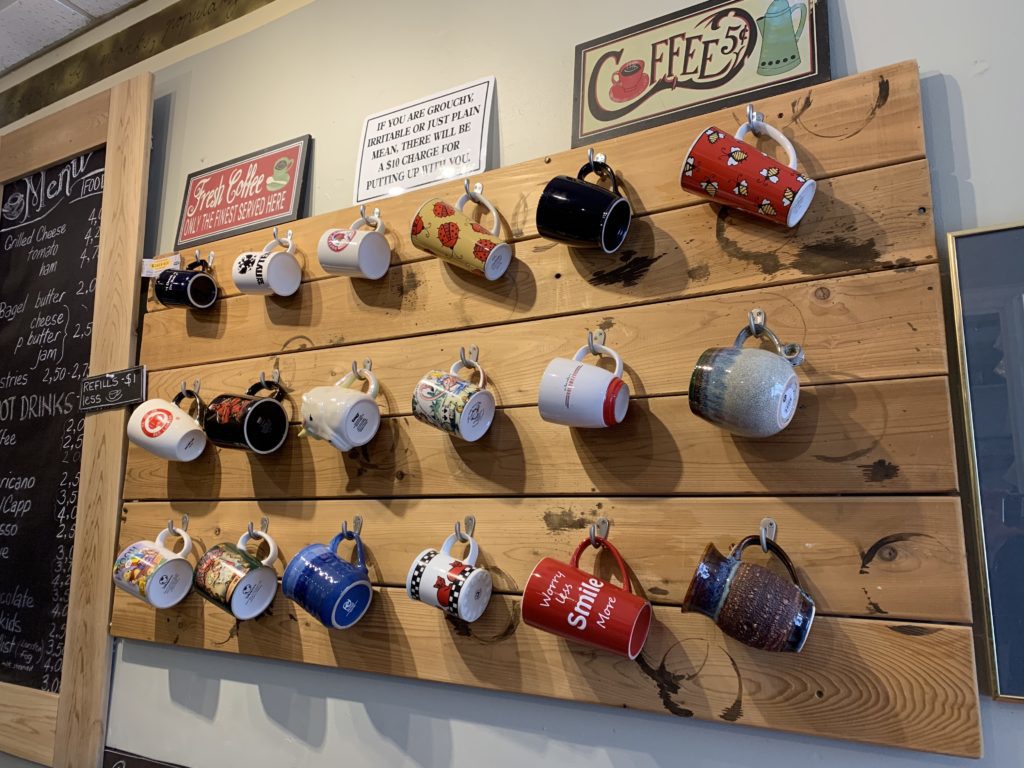
A woman with shoulder-length blond hair strides through a paint-chipped door with a grid of small glass windows. Kathy Luchwin’s nostrils fill with the scent of fresh coffee as she crosses the small space to the wall lined with mugs. On a wooden board, three rows of mugs, each row holding six coffee cups, hang on the wall. Kathy reaches for the pottery mug in the bottom row, its textured surface coloured brown and blue reflecting rays of sun coming through the front window. Kathy walks over to the coffee bar, places her mug on the counter, and Steven Turner gets to work on her usual order.
Business partners and friends, Steven and Jessie Retief work together in the small space behind the wooden countertop as customers flow in and out of the shop. Steven works with ease, pouring cup after cup for each new, or returning, customer who walks through the door. That’s how it’s been for the past 12 years since The Big Guys Little Coffee shop opened. As he makes coffee, Steven smiles and says, “It’s more like your front room than a coffee shop.” He wants the lost and the lonely to congregate here and make them belong somewhere. In their own way, they all do.
A man named Robin reaches for the front door and, as it swings open, little silver bells chime to announce a new customer coming in. As each patron enters the shop, Steven is already working on their order. He uses an association game to remember names and faces in connection with their drink. For Robin, Steven thinks of Winnie-The-Pooh, associating his name with the character Christopher Robin.
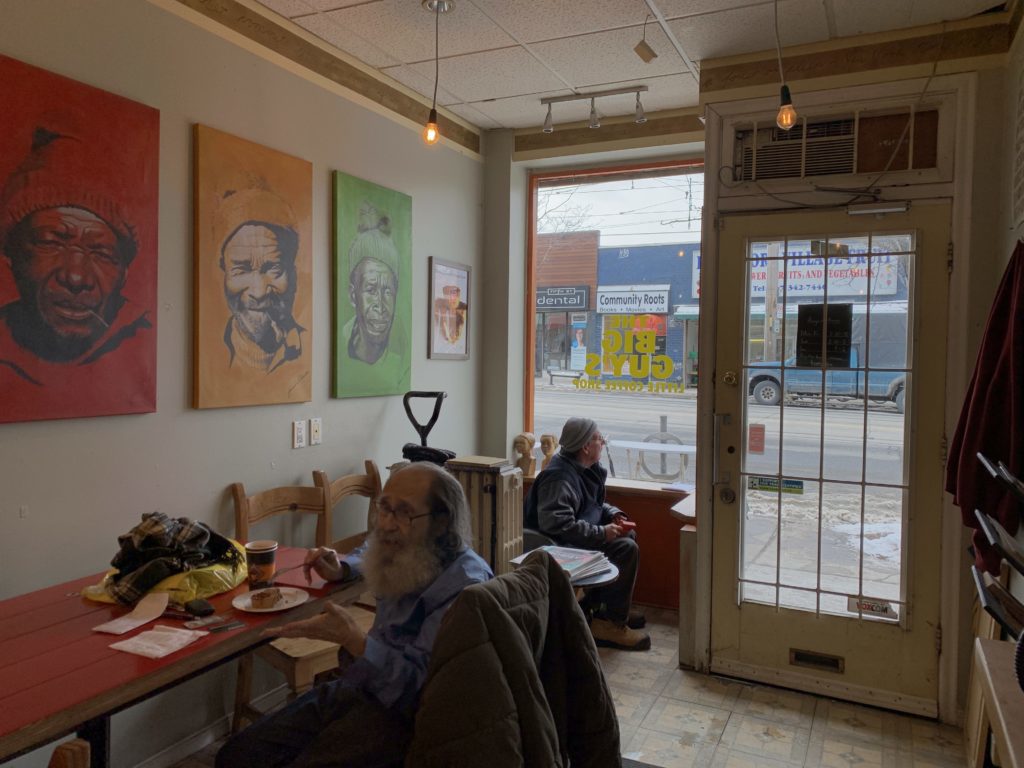
As they work through the busy day, Jessie and Steven look out the door to see yet another frequent coffee drinker, Stanley, saunter in. His hair is wiry and grey and puffs out all the way around his head. His wrinkled features just peek through his beard. As he talks, it’s not hard to tell he has big gaps where teeth should be, and his dirty clothes fit loosely over his thin frame. As he shuffles in, Stanley mutters something about the Titanic before Steven scoffs at him, beginning their usual banter. “I’m not nice to him,” Steven jokes with a smirk on his face. Stanley walks up to the coffee bar and orders his usual. He doesn’t take out a wallet—it’s questionable whether he even has one—but Steven and Jessie have never made anyone who doesn’t have the money pay for their order.
The vinyl flooring is warped and salt-stained from years of rough winters, and most of the furniture inside has been donated or refurbished. The only table in the small cafe is a donated door, painted bright red and held up by four dark brown wooden legs, with different wooden chairs surrounding it. Just looking at the cozy space, you know that everyone is welcome here.
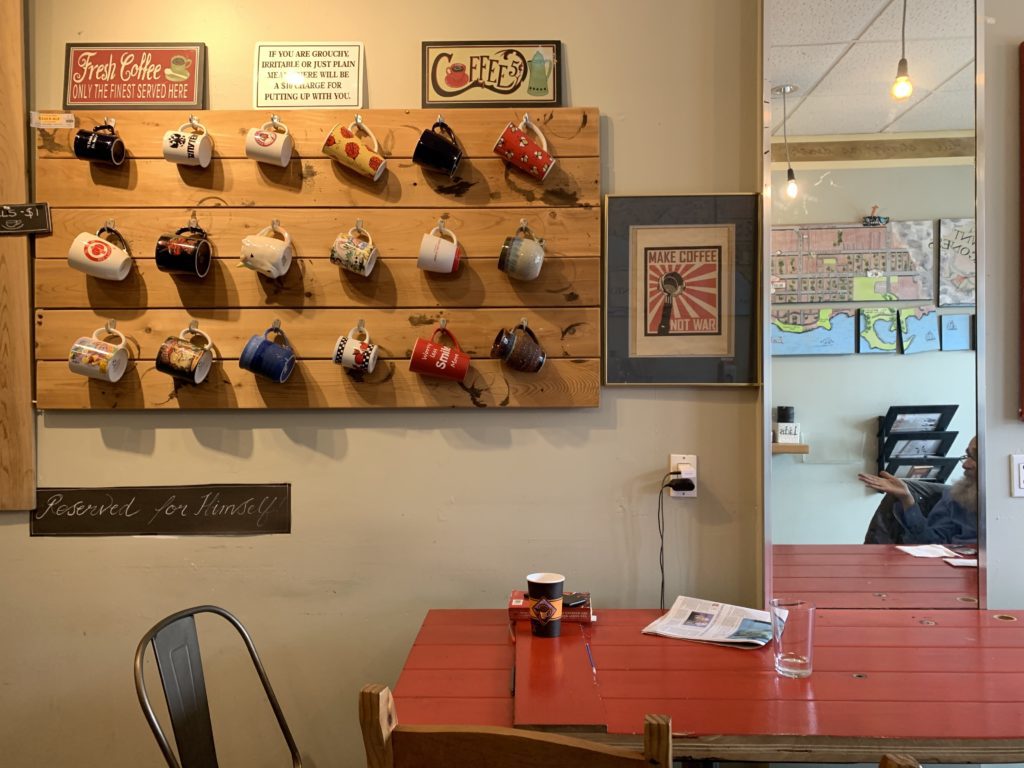
A group of men brought together by the coffee shop walk in, all of them bald, seeming to be in their 40s or 50s. They grab their usual steaming hot drinks and sit at the red door-table. Regulars in the shop have dubbed this trio, fondly, “The Bald Brigade.”
Steven calls it a safe space. “Maybe to our detriment, we always encourage people to speak their minds,” he muses. “We’ve had heated debates in here, not always politically correct. We’re also 50 now, so political correctness has passed us by to a degree.”
One wall of the cafe is shared with a shop called Muse Apothecary next door. After getting their coffee, customers can walk through a doorway that connects the two stores and find themselves in a different world. The aroma of the apothecary floats through the partition with scents of lavender and sage. Continuing through a second doorway on the other side of the apothecary, you end up amongst the colours of the rainbow filling a third storefront, where balls of yarn are packed tightly on white shelves lining the whole circumference of the store; and the fibres work as a sort of insulation that keeps the store quiet.
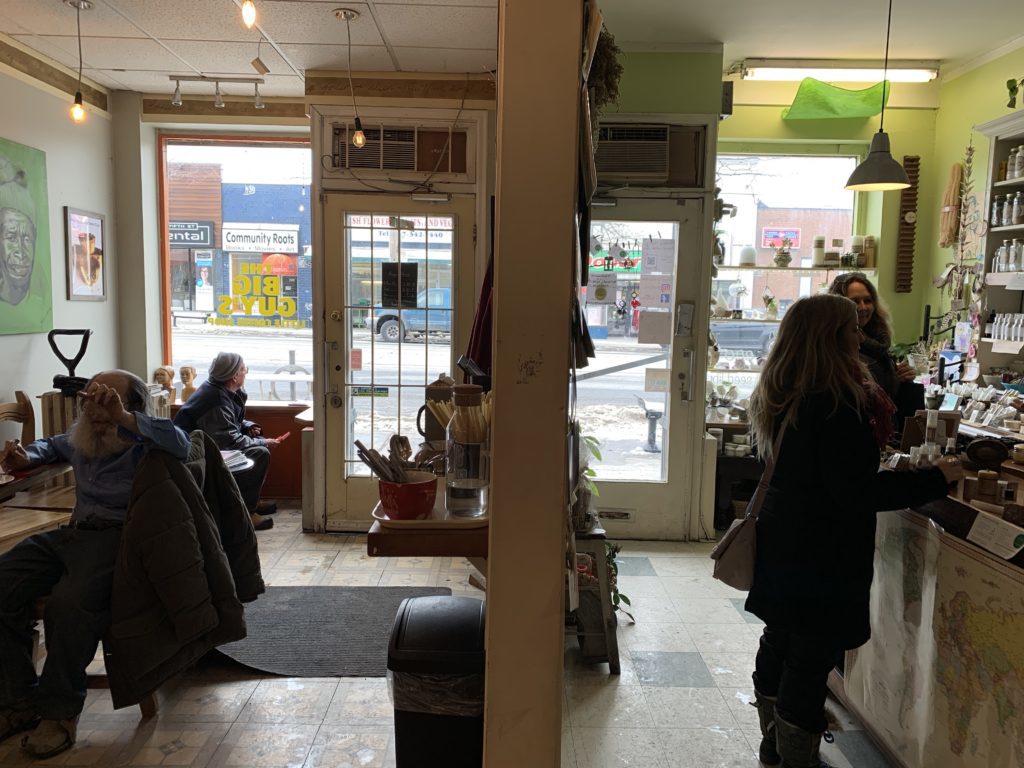
The divide between The Big Guys Little Coffee Shop (left) and Muse Apothecary (right)
Feb. 28, 2020. (Abigale McCulloch/T•)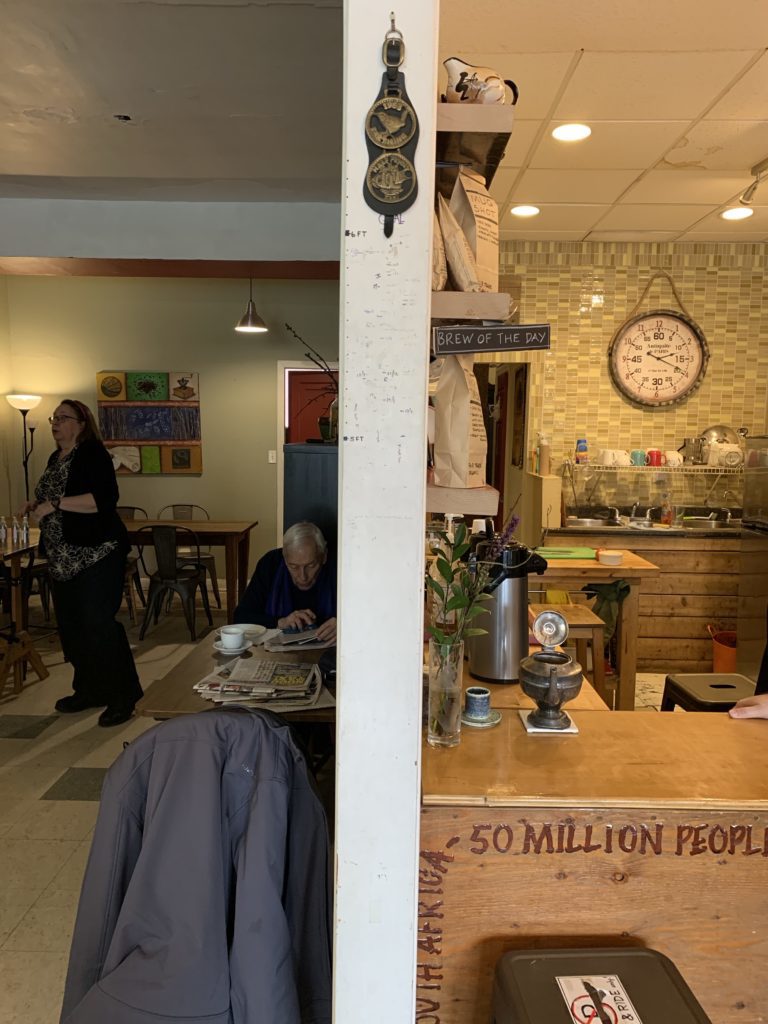
The back of both stores, The Big Guys Little Coffee Shop (right) Muse Apothecary (left)
Feb. 28, 2020. (Abigale McCulloch/T•)
The three connected shops work in harmony with one another. Guests can grab a coffee, go to the apothecary and sit on one of the couches in the back, or they can head further through to knit while they sip and snack.
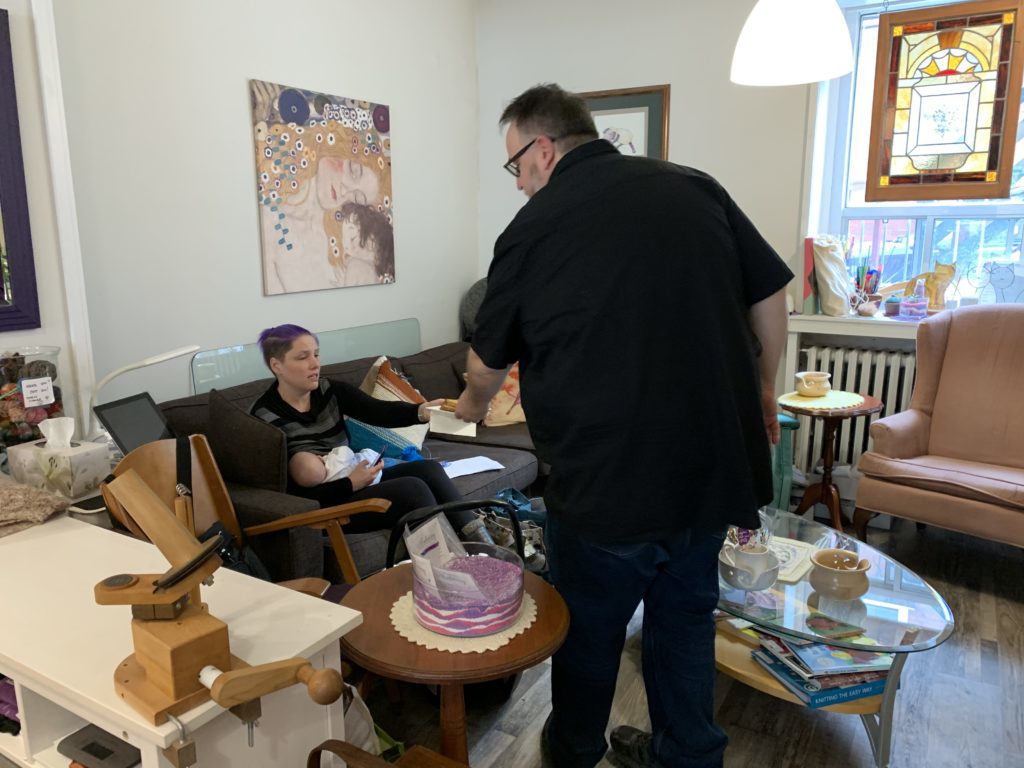
Monika Meulman, the owner of Muse Apothecary, says she is never afraid to let in any type of clientele because she knows whoever is working at the coffee shop or the yarn store has her back. She mentions a man who comes in almost every day to talk, “high as a kite.” She says that she isn’t confident she would be able to let just anyone in to chat with if she was located in a more private studio. The support the three stores bring to each other helps them all thrive in their own way—in their business lives, as well as in their ability to feel safe when working with a large range of customers.
Not only do Steven and Jessie look out for their neighbours, they also look out for their own customers. Jessie remembers an incident involving a man named Fred—he’s an older gentleman who has been coming to the cafe for years. As Steven and Jessie were working one day they received a frantic call from Fred. He had fallen in an alleyway down the street and couldn’t get up. Jessie and Steven ran to his aid. “He’s well known in the neighbourhood, and we’re the people he called,” Jessie adds.
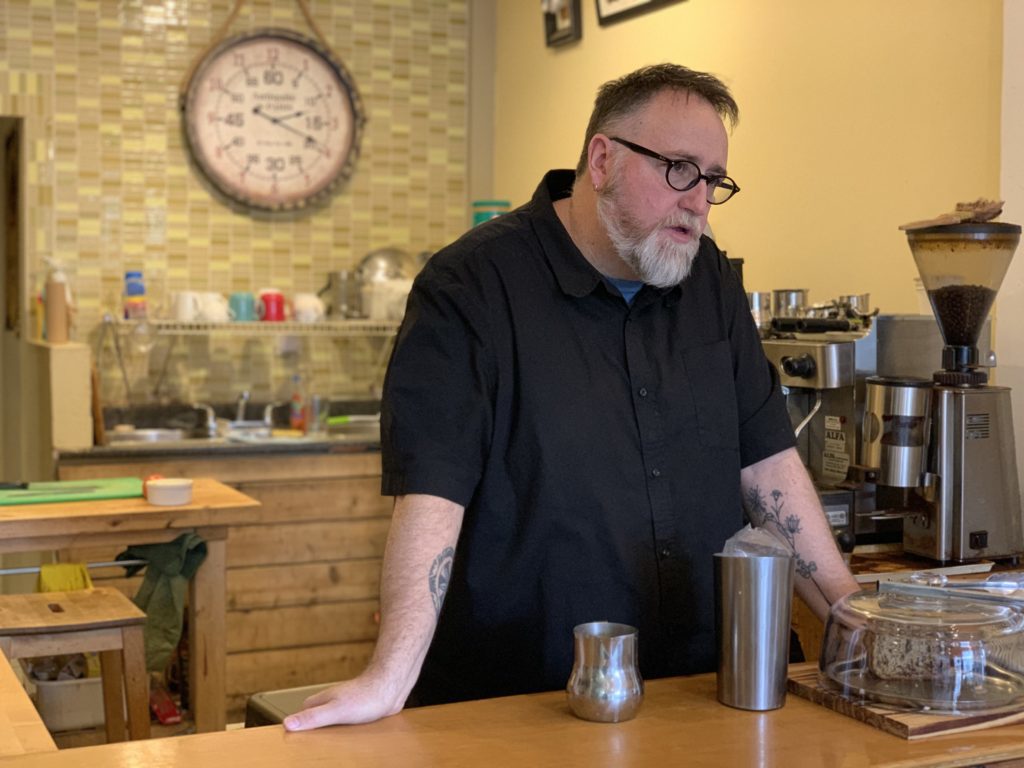
Steven mentions a church group that he has given use of the cafe for free every Thursday for five years. “Steven’s not a church-goer,” Jessie says; yet, as Steven talks about the group, his eyes light up and his face draws into a smile, pulling his short grey beard up on each side.
The church group has a key to let themselves in, and to lock up when they’re done. The group is also welcome to help themselves to coffee and tea while they sit on the worn red leather couches in the apothecary next door discussing religion. Every week, Steven receives a thank-you note from them saying how grateful they are to be able to use the space for free.
“We’ve never shunned anybody away. We have two or three people who come every day for coffee, but we’ve never asked them for money because they don’t have any.” Steven says, “We actually had one guy come in the other day, and he was fighting with us and said ‘you just want me for my money!’” Steven recalls the incident and smiles at his response: “You’ve never paid your bill here—you owe me $7,000!”
